- Python Basic Programs
- Python Program Examples
- Python Print Hello World
- Python Get Input from User
- Python Add Two Numbers
- Add Subtract Multiply Divide
- Python Check Even or Odd
- Python Check Prime or Not
- Python Check Alphabet or Not
- Python Check Vowel or Not
- Python Check Leap Year or Not
- Check Reverse equal Original
- Check Positive Negative Zero
- Python Check Armstrong or Not
- Python Check Palindrome or Not
- Python Check Perfect Number
- Python Find Reverse of Number
- Python Count Digits in Number
- Python Add Digits of Number
- Sum of First and Last Digits
- Python Product of Mid Digits
- Sum of Squares of Digits
- Interchange Digits of Number
- Python Sum of n Numbers
- Python Print ASCII Values
- Python Swap Two Numbers
- Python Swap Two Variables
- Python Fahrenheit to Celsius
- Python Celsius to Fahrenheit
- Python Display Calendar
- Python Days into Years, Weeks
- Find Largest of Two Number
- Find Largest of Three Number
- Python Print Fibonacci Series
- Generate Armstrong Numbers
- Python Make Simple Calculator
- Python Add Binary Numbers
- Binary Number Multiplication
- Python Mathematical Programs
- Find Sum of Natural Numbers
- Find Average of n Numbers
- Python Print Multiplication Table
- Print Table using Recursion
- Python Find Average Percentage
- Python Find Grade of Student
- Find Square Root of Number
- Python Print Prime Numbers
- Find Numbers Divisible by
- Python Find Factors of Number
- Python Find Factorial of a Number
- Python Find HCF & LCM
- Python Kilometres to Miles
- Python Find Area of Square
- Python Find Area of Rectangle
- Python Find Area of Triangle
- Python Find Area of Circle
- Python Find Perimeter of Square
- Find Perimeter of Rectangle
- Python Find Perimeter of Triangle
- Find Circumference of Circle
- Python Simple Interest
- Python Solve Quadratic Equation
- Python Different Set of Operations
- Python Display Powers of 2
- Python Find nCr & nPr
- Python Pattern Programs
- Python Print Pattern Programs
- Python Print Diamond Pattern
- Python Print Floyd's Triangle
- Python Print Pascal's Triangle
- Python List Programs
- Python Count Even/Odd in List
- Python Positive/Negative in List
- Python Even Numbers in List
- Python Odd Numbers in List
- Python Sum of Elements in List
- Sum of Odd/Even Numbers
- Python Element at Even Position
- Python Element at Odd Position
- Python Search Element in List
- Python Largest Number in List
- Python Smallest Number in List
- Python Second Largest in List
- Python Second Smallest in List
- Python Insert Element in List
- Python Delete Element from List
- Python Multiply Numbers in List
- Swap Two Elements in List
- Python 1D Array Program
- Python Linear Search
- Python Binary Search
- Python Insertion Sort
- Python Bubble Sort
- Python Selection Sort
- Remove Duplicates from List
- Python Reverse a List
- Python Merge Two List
- Python Copy a List
- Python Conversion Programs
- Python Decimal to Binary
- Python Decimal to Octal
- Python Decimal to Hexadecimal
- Python Binary to Decimal
- Python Binary to Octal
- Python Binary to Hexadecimal
- Python Octal to Decimal
- Python Octal to Binary
- Python Octal to Hexadecimal
- Python Hexadecimal to Decimal
- Python Hexadecimal to Binary
- Python Hexadecimal to Octal
- Python Matrix Programs
- Python Add Two Matrices
- Python Subtract Two Matrices
- Python Transpose Matrix
- Python Multiply Matrices
- Python String Programs
- Python Print String
- Python Find Length of String
- Python Compare Two Strings
- Python Copy String
- Python Concatenate String
- Python Reverse a String
- Python Swap Two Strings
- Python Uppercase to Lowercase
- Python Lowercase to Uppercase
- Python Check Substring in String
- Python Count Character in String
- Count Repeated Characters
- Python Count Word in Sentence
- Python Count Each Vowels
- Python Capitalize Character
- Python Capitalize Word in String
- Python Smallest/Largest Word
- Remove Spaces from String
- Remove Duplicate Character
- Remove Vowels from String
- Remove Punctuation from String
- Python Remove Word in String
- Python Remove Duplicate Words
- WhiteSpace to Hyphens
- Replace Vowels with Character
- Replace Character in String
- Python Sort String in Alphabetical
- Sort Word in Alphabetical Order
- Extract Number from String
- Python Check Anagram Strings
- Python File Programs
- Python Read a File
- Python Write to File
- Python Append Text to File
- Python Copy Files
- Python Merge Two Files
- Python Counts Characters in File
- Python Count Words in File
- Python File Content in Reverse
- Python Lines Contains String
- Python Delete Line from File
- Python Capitalize Word in File
- Python Replace Text in File
- Replace Specific Line in File
- Python Find Size of File
- Python List Files in Directory
- Python Delete Files
- Python Misc Programs
- Python Reverse a Tuple
- Python Merge Two Dictionary
- Python bytes to String
- Python bytearray to String
- Generate Random Numbers
- Python Print Address of Variable
- Python Print Date and Time
- Python Get IP Address
- Python Shutdown/Restart PC
- Python Tutorial
- Python Tutorial
Python program to capitalize each word in a file
In this article, you will learn and get code in Python to capitalize each and every word in a text file entered by the user at runtime.
Things to do Before the Program
Because the program given below is used to capitalize each word in a file, That is, after executing the program given below, all words in a file entered by the user get capitalized. Capitalizing means that the first letter of a word becomes a capital letter.
Therefore, first create a file named codescracker.txt with the following content:
hello python this is a file
Save this file inside the current directory, the directory where the Python program to capitalize each word in a file is saved. Here is a snapshot of the opened file, codescracker.txt:
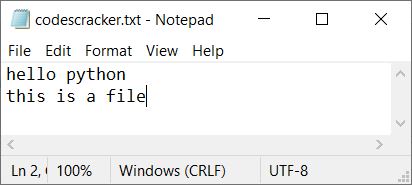
Now let's create a Python program to capitalize all the words in this file.
Capitalize each word in the file
This Python receives the name of the file from the user at run-time and capitalizes all of its words. The question is: write a Python program to capitalize each word in a file. Here is its answer:
totContent = "" print("Enter the Name of File: ") fileName = str(input()) fileHandle = open(fileName, "r") for content in fileHandle: newContent = content.title() totContent = totContent + newContent fileHandle.close() fileHandle = open(fileName, "w") fileHandle.write(totContent) print("All Words Capitalized Successfully!") fileHandle.close()
Here is its sample run:
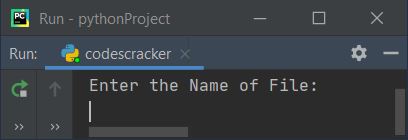
Now enter the name of the file, say, codescracker.txt, and press the ENTER key to capitalize the first letter of every word in this file. Here is the sample run:
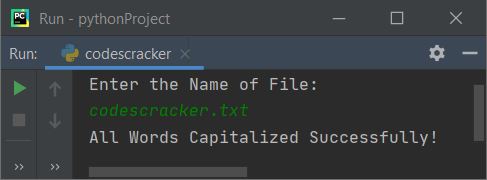
And here is the opened file codescracker.txt after executing the above program:
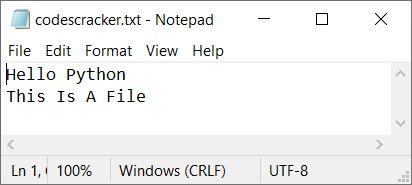
Note: The title() method converts the first letter of each word into a capital letter or uppercase.
Note: To capitalize each word without using title(), refer to the capitalize each word in the string article to implement the code manually.
The program works in such a way that the file is opened in reading mode, and all of its content gets read. All words get capitalized and initialized to the totContent variable. Now the file gets closed using the close() method. The file again gets opened, but in writing mode this time, to put the content of totContent in the same file. In this way, we've capitalized all the words in a file.
Modified version of the previous program
This program is a modified version of the previous program. This program includes error handling code while operating with files. That is, it handles the error when the file entered by the user doesn't exist in the directory. Let's have a look at the program:
totContent = "" print(end="Enter the Name of File: ") fileName = str(input()) try: fileHandle = open(fileName, "r") for content in fileHandle: newContent = content.title() totContent = totContent + newContent fileHandle.close() try: fileHandle = open(fileName, "w") fileHandle.write(totContent) print("\nAll Words in \"" + fileName + "\" Capitalized Successfully!") print(end="\nWant to see the Content of File (y/n): ") ch = input() if ch=='y': fileHandle = open(fileName, "r") for content in fileHandle: print(end=content) else: print("Exiting...") fileHandle.close() print() except IOError: print("Error Occurred!") except IOError: print("\nThe \"" + fileName + "\" is not Exist!") print("Exiting...")
Here is its sample run with user input, say codescracker.txt (an existing file):
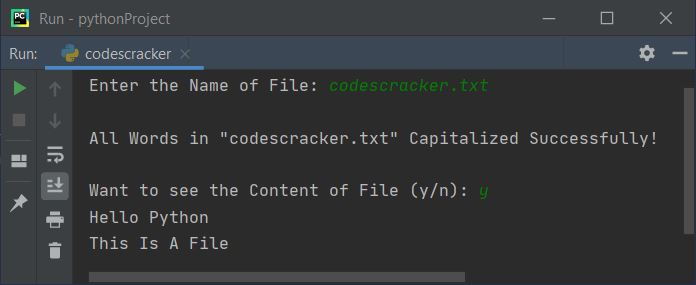
And here is another sample run with user input, say codes.txt (a non-existing file):
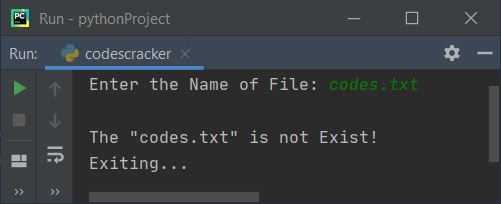
« Previous Program Next Program »